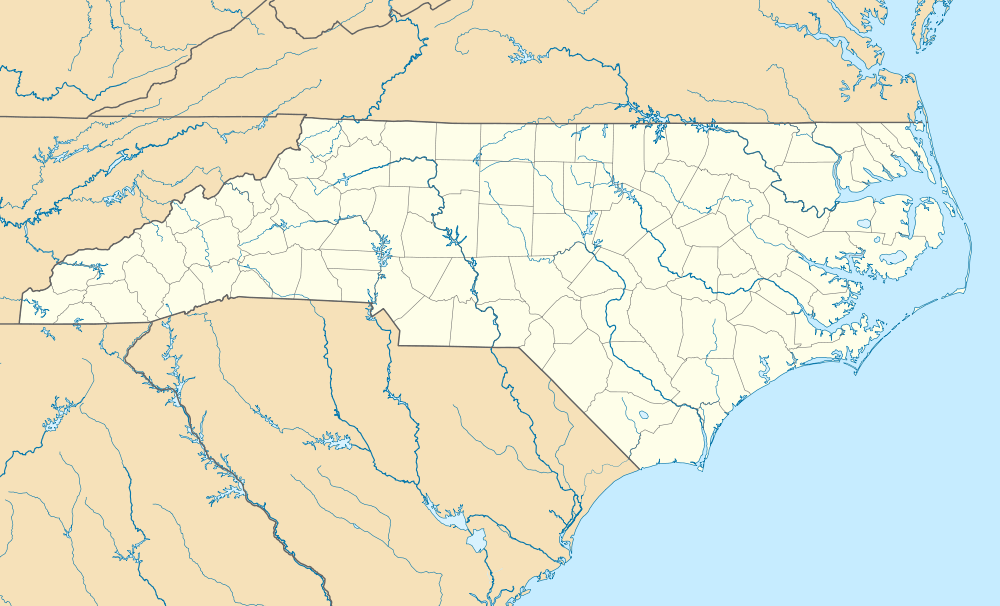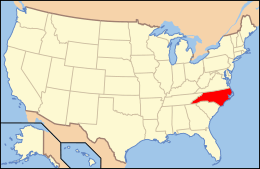Alston-DeGraffenried Plantation
Alston-DeGraffenried Plantation or Alston-DeGraffenried House is a historic property located in Chatham County, North Carolina, near Pittsboro, North Carolina. It is listed on the National Register of Historic Places and includes a plantation house built between about 1810 and 1825, and its surrounding agricultural fields. The property was first listed on the National Register of Historic Places in 1974 and the listed area was increased in 1993.[1] The house and the surrounding land are identified as a national historic district.
Alston-DeGraffenried Plantation | |
  | |
| Location | West of Pittsboro off U.S. 64; also the northern side of U.S. Route 64, 0.4 miles (0.64 km) west of its junction with NC 1564, near Pittsboro, North Carolina |
|---|---|
| Coordinates | 35°43′59″N 79°14′36″W |
| Built | ca. 1810-1825 |
| Architect | Broome, Meleus |
| Architectural style | Georgian, Federal, Federal vernacular |
| NRHP reference No. | 93001132[1] (original) 74001339[1] (increase) |
| Significant dates | |
| Added to NRHP | November 18, 1974 (original) |
| Boundary increase | October 21, 1993 (boundaries increased) |
The district encompasses seven contributing buildings, two contributing sites, and one contributing structure. They include the main house, kitchen, pig boiling pit, four-seat privy, smokehouse, two-seat privy, corn crib, small barn, well shelter, and the surrounding landscape. The main house is a two-story, five bay, Georgian/ Federal style dwelling. It sits on a raised brick basement and has a tall hipped roof. It has a full-width Victorian porch and a number of one-story rear additions.[2][3]
The house was built for Delia Alston by her father, Joseph John "Chatham Jack" Alston, at the time of Delia's marriage to John Baker DeGraffenried. It was one of six homes that Alston, one of the largest landowners and slaveowners in the area, built for his children.[4] He also built nearby Aspen Hall.[5]
The house was actually built by Joseph John (Chatham Jack) Alston for his eldest son, John Jones Alston (1792-1842), who married Adaline Williams (1805-1885). It later passed to their daughter, Delia (1829-1914), upon the death of Adaline in 1885. Note that Delia was not the daughter of Chatham Jack as stated above; she was his granddaughter. Delia married John Baker DeGraffenriedt (1823-1899; note that correct spelling differs from the title of this article). The house and plantation became known as the "DeGraffenriedt" house, but it should be known as the "John Jones and Adaline Williams Alston" house.
References
- "National Register Information System". National Register of Historic Places. National Park Service. March 13, 2009.
- Survey and Planning Unit (September 1974). "Alston-DeGraffenried House" (pdf). National Register of Historic Places - Nomination and Inventory. North Carolina State Historic Preservation Office. Retrieved 2014-08-01.
- Kitty Houston and Lee Novick (April 1993). "Alston-DeGraffenried Plantation (Boundary Increase/Amendment)" (PDF). National Register of Historic Places - Nomination and Inventory. North Carolina State Historic Preservation Office. Archived from the original (pdf) on 2012-12-28. Retrieved 2014-08-01.
- Federal Writers' Project (1944), North Carolina, A Guide to the Old North State, page 498
- Charlotte V. Brown, and Jim Sumner (April 1981). "Aspen Hall" (pdf). National Register of Historic Places - Nomination and Inventory. North Carolina State Historic Preservation Office. Retrieved 2014-08-01.
External links
- Harland's Creek Farm (farm operated on the property by Judith T. Lessler)

